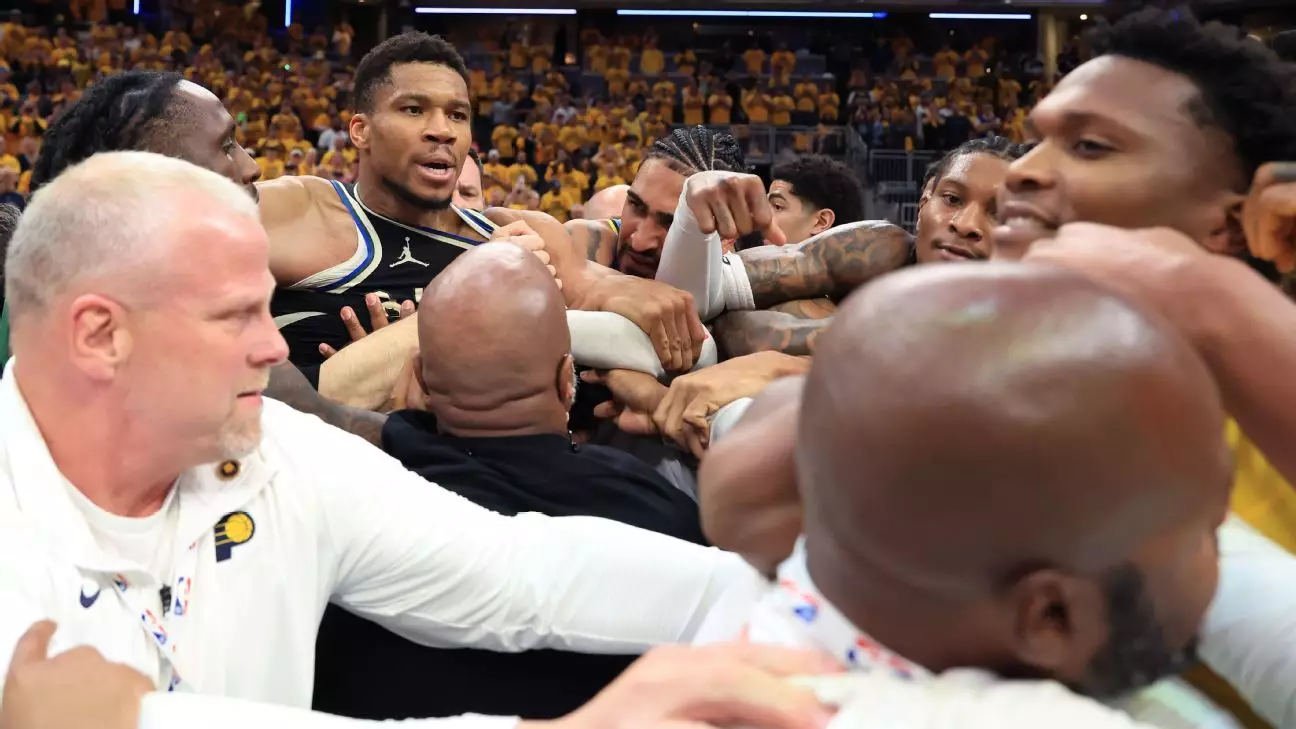The realm of professional sports is often highlighted by moments of jubilation and triumph, but beneath the surface lie tensions that can ignite in an instant. Following Game 5 of the first-round playoff series between the Milwaukee Bucks and the Indiana Pacers, the heated encounters exemplified how high-stakes competition can blur the lines between celebration and provocation. Milwaukee Bucks’ superstar Giannis Antetokounmpo found himself embroiled in a confrontation that escalated tensions not just on the court but also among the fans, notably involving Tyrese Haliburton’s father, John Haliburton. This incident speaks volumes about how personal and emotional these games can be, framing sportsmanship against the sheer passion of a parent supporting their child.
A Game of Fine Margins
The game itself had all the makings of an epic showdown, culminating in a nail-biting finish where the Pacers secured a series-clinching victory with a stunning last-minute layup from Haliburton. This moment, while a tribute to Indiana’s tenacity, was overshadowed by the antics off the court. While Antetokounmpo delivered an impressive triple-double performance—30 points, 20 rebounds, and 13 assists—his emotions ran high as he faced the abrupt end of the Bucks’ postseason journey. For fans and analysts alike, the spotlight shifted from the tangible achievements on the scoreboard to the unfiltered emotions that bled into a public confrontation.
The Clash of Personalities
In the aftermath, Antetokounmpo described his altercation with John Haliburton as a clash of perspectives. What began as a celebratory display from Haliburton’s father devolved into a confrontation that challenged the essence of sportsmanship. Antetokounmpo argued that there should be an expectation of humility, particularly in moments of defeat. His sentiment—that one should respect the opposing team despite the heat of the moment—reflects a mindset that prioritizes dignity over aggressive displays of enthusiasm. Conversely, John Haliburton’s emotional reaction can be seen as an instinctual response of a proud parent reveling in his son’s success, albeit misplaced given the competitive environment.
Lessons in Accountability
Tyrese Haliburton, standing as a bridge between the two sides, demonstrated maturity in addressing the issue while acknowledging his father’s excitement. Haliburton’s remark that basketball should remain on the court highlights a larger conversation about the emotional stakes involved. His ability to call out his father’s conduct while still celebrating his victory showcases a nuanced understanding of the realities in competitive sports. The subsequent conversation between Tyrese and John encapsulated the lessons that need to be communicated at all levels regarding the importance of boundaries and respectful conduct.
Aftermath and Reflection
In a rapid response, John Haliburton took to social media to apologize, marking a display of accountability rarely seen in the high-pressure environment of sports. His public acknowledgment of the inappropriateness of his actions illustrates an important lesson in maintaining one’s composure, not just for oneself but for the larger community involved in the sport. In an age where emotions often rule narratives—not only in sports but also in wider society—his apology serves to remind fans and players alike of the responsibilities they hold.
A Shrugged Off Rivalry
As if the game lacked enough drama, Antetokounmpo faced further tension when he exchanged words with Pacers guard Bennedict Mathurin. Encounters like these highlight an escalating trend within sports where emotions frequently combust, leading to more than just a clash of numbers; they lead to personal confrontations and rivalries that run deeper than the scoreline reflects. This exchange, much like the earlier altercation, points to a culture rife with competitive tensions and the need for athletes to manage their emotions on multiple fronts—on and off the court.
The fallout from Game 5 exemplifies how sports can illuminate not just athletic prowess but also the importance of emotional intelligence. The layers of personal interaction, emotional reflection, and public accountability are crucial in understanding the true spirit of competition.


Leave a Reply